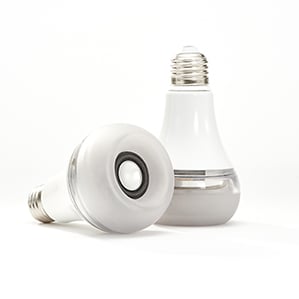Startup’s Lightbulbs Also Stream Music
A startup is adding small speakers to lightbulbs, which it thinks will make it easier to stream music wirelessly at home without requiring the use of more power outlets or counter space.

On Wednesday, New York-based Astro started taking pre-sales for a device called Twist, which is an LED bulb with a built-in wireless speaker that uses Apple’s AirPlay technology to stream music from iPhones, iPads, and Mac computers over Wi-Fi. The speaker bulb, which twists into a standard-size light socket, contains white and yellow LEDs, the brightness or dimness of which coördinates wirelessly with other Twist bulbs that contain just LEDs. Astro, which plans to ship the gadgets early next year, says a starter pack with two LED bulbs, a speaker bulb, and a handheld dimmer switch will cost $399, reduced to $249 for two months to encourage people to sign up.
While companies like Philips Hue focus on automating and customizing the lights themselves, Twist is among a handful of companies thinking of the lightbulb as a conduit for wireless audio, too. The company says it plans to add additional functions in the future as well.
The company is entering a growing but perhaps mercurial market: tech market researcher Gartner estimates that there are 294 million connected gadgets like “smart” lights, locks, and motion sensors in homes, predicting that this figure will rise to more than a billion by 2017. But Argus Insights, which also researches the tech market, said in a recent report that demand for connected home gadgets fell in the first half of the year and was 15 percent lower in May than it was a year earlier—a sign that consumers may be weary of the ever-increasing number of automatable devices available.
Shaun Springer, who founded Astro a year ago, believes the product will find a niche by making it simpler for people to add connected gadgets to their homes—particularly in small spaces like apartments, where people are often renting and may not want to install things like switches or wiring.
Springer used to work as a programmer for the home automation company Crestron Electronics, where he says he collected pricey electronics as a reward for good work, including some powerful audio devices like a $20,000 amplifier and a surround-sound system. He couldn’t use the devices in his small apartment because the noise bothered his neighbors, he says, and after moving to an even smaller apartment he sold the equipment and used the proceeds to start Astro (the company also has venture capital funding, though it hasn’t publicly divulged the funders or amounts).
Music plays with AirPlay over Wi-Fi; users can choose whichever apps they want on their handsets. The brightness and dimness of the lights is controlled using low-energy Bluetooth and a proprietary protocol, and Springer says they can be placed as far as about 30 meters apart. An app will be required for initial setup of the Twist bulbs, he says.
Springer showed me a quick demo in which a Twist speaker bulb and a couple of plain LED bulbs were screwed into table lamps. He played bits of a few different things through the speaker: “MC’s Act like They Don’t Know” by KRS-One, “Taylor” by Jack Johnson, and spoken-word meditation instruction. At a moderately loud volume, the music and spoken words sounded okay, if a bit scratchy. The color and brightness of the lights, controlled by a handheld dimmer switch, remained coördinated as Springer adjusted them, and when he turned one off, adjusted another one, and then turned the first one back on, they synched up once again.
Keep Reading
Most Popular
Large language models can do jaw-dropping things. But nobody knows exactly why.
And that's a problem. Figuring it out is one of the biggest scientific puzzles of our time and a crucial step towards controlling more powerful future models.
The problem with plug-in hybrids? Their drivers.
Plug-in hybrids are often sold as a transition to EVs, but new data from Europe shows we’re still underestimating the emissions they produce.
How scientists traced a mysterious covid case back to six toilets
When wastewater surveillance turns into a hunt for a single infected individual, the ethics get tricky.
Google DeepMind’s new generative model makes Super Mario–like games from scratch
Genie learns how to control games by watching hours and hours of video. It could help train next-gen robots too.
Stay connected
Get the latest updates from
MIT Technology Review
Discover special offers, top stories, upcoming events, and more.